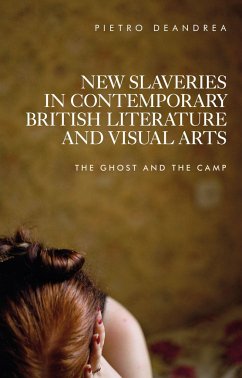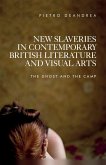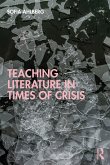Pietro Deandrea
New Slaveries in Contemporary British Literature and Visual Arts
The Ghost and the Camp
Pietro Deandrea
New Slaveries in Contemporary British Literature and Visual Arts
The Ghost and the Camp
- Gebundenes Buch
- Merkliste
- Auf die Merkliste
- Bewerten Bewerten
- Teilen
- Produkt teilen
- Produkterinnerung
- Produkterinnerung
A study of the literature and visual arts concerned with the many and diverse forms of slaveries produced by globalisation in Britain since the early 1990s. -- .
Andere Kunden interessierten sich auch für
![New slaveries in contemporary British literature and visual arts New slaveries in contemporary British literature and visual arts]() Pietro DeandreaNew slaveries in contemporary British literature and visual arts36,99 €
Pietro DeandreaNew slaveries in contemporary British literature and visual arts36,99 €![Benjamin Markovits Benjamin Markovits]() Benjamin Markovits34,99 €
Benjamin Markovits34,99 €![Marilynne Robinson Marilynne Robinson]() Marilynne Robinson136,99 €
Marilynne Robinson136,99 €![Teaching Literature in Times of Crisis Teaching Literature in Times of Crisis]() Sofia AhlbergTeaching Literature in Times of Crisis43,99 €
Sofia AhlbergTeaching Literature in Times of Crisis43,99 €![Into the Fantastical Spaces of Contemporary Japanese Literature Into the Fantastical Spaces of Contemporary Japanese Literature]() Into the Fantastical Spaces of Contemporary Japanese Literature51,99 €
Into the Fantastical Spaces of Contemporary Japanese Literature51,99 €![Breathe Breathe]() Joyce Carol OatesBreathe22,99 €
Joyce Carol OatesBreathe22,99 €![Breathe Breathe]() Joyce Carol OatesBreathe34,99 €
Joyce Carol OatesBreathe34,99 €-
-
-
A study of the literature and visual arts concerned with the many and diverse forms of slaveries produced by globalisation in Britain since the early 1990s. -- .
Hinweis: Dieser Artikel kann nur an eine deutsche Lieferadresse ausgeliefert werden.
Hinweis: Dieser Artikel kann nur an eine deutsche Lieferadresse ausgeliefert werden.
Produktdetails
- Produktdetails
- Verlag: Manchester University Press
- Seitenzahl: 204
- Erscheinungstermin: 1. März 2015
- Englisch
- Abmessung: 216mm x 142mm x 23mm
- Gewicht: 422g
- ISBN-13: 9780719096433
- ISBN-10: 071909643X
- Artikelnr.: 42467261
- Herstellerkennzeichnung
- Libri GmbH
- Europaallee 1
- 36244 Bad Hersfeld
- gpsr@libri.de
- Verlag: Manchester University Press
- Seitenzahl: 204
- Erscheinungstermin: 1. März 2015
- Englisch
- Abmessung: 216mm x 142mm x 23mm
- Gewicht: 422g
- ISBN-13: 9780719096433
- ISBN-10: 071909643X
- Artikelnr.: 42467261
- Herstellerkennzeichnung
- Libri GmbH
- Europaallee 1
- 36244 Bad Hersfeld
- gpsr@libri.de
Pietro Deandrea is Associate Professor in English Literature at the University of Torino, Italy
Introduction Part I 1. Crossing the 2007 Bicentenary: transatlantic memory
and the slaves of globalisation 2. New slaveries in literature and the
visual arts 3. Troping new slaveries: ghosts of postcolonialism, Marx and
deconstruction 4. Troping new slaveries: Holocaust studies and the
concentration camp 5. A theory in the making 6. Argument and outline of the
book Part II 7. Investigating migrant domestic workers 8. Bridget
Anderson's Britain's Secret Slaves (1993) 9. Ruth Rendell's Simisola (1994)
Part III 10. The ghost and the concentration camp in the twenty-first
century 11. Recovering the voices and beyond: Louisa Waugh's Selling Olga
(2006) and Rahila Gupta's Enslaved (2007) 12. From speaking to inscribing:
Chris Abani's Becoming Abigail (2006) 13. Enslaved childhood and the
concentrationary system of detention centres: Chris Cleave's The Other Hand
(2008) 14. United bloody Nations: Marina Lewycka's Two Caravans (2007) and
humour 15. Chasing the overworld: Ian Rankin's Fleshmarket Close (2004) and
the crime story Part IV 16. The British concentrationary archipelago in
cinema, photography and drama 17. Cinema: reshaping the gothic in Nick
Broomfield's Ghosts (2006) 18. Photography: behind a screen in Dana Popa's
Not Natasha (2009) 19. Drama: traumatic deconstructions of the stage in
Clare Bayley's The Container (2007), Cora Bissett and Stef Smith's Roadkill
(2011), Abi Morgan's Fugee (2008) and Lucy Kirkwood's It Felt Empty When
the Heart Went at First but It Is Alright Now (2009) Part V 20. Dystopian
narratives 21. The camp's liminal centrality: from PD James's The Children
of Men (1992) to Alfonso Cuarón's Children of Men (2006) 22. Spectral
slavery and the disappearing camp: Kazuo Ishiguro's Never Let Me Go (2005)
Part VI 23. Conclusion 24. Spectralising the camp 25. Post colonialism, new
slaveries and borders Index
and the slaves of globalisation 2. New slaveries in literature and the
visual arts 3. Troping new slaveries: ghosts of postcolonialism, Marx and
deconstruction 4. Troping new slaveries: Holocaust studies and the
concentration camp 5. A theory in the making 6. Argument and outline of the
book Part II 7. Investigating migrant domestic workers 8. Bridget
Anderson's Britain's Secret Slaves (1993) 9. Ruth Rendell's Simisola (1994)
Part III 10. The ghost and the concentration camp in the twenty-first
century 11. Recovering the voices and beyond: Louisa Waugh's Selling Olga
(2006) and Rahila Gupta's Enslaved (2007) 12. From speaking to inscribing:
Chris Abani's Becoming Abigail (2006) 13. Enslaved childhood and the
concentrationary system of detention centres: Chris Cleave's The Other Hand
(2008) 14. United bloody Nations: Marina Lewycka's Two Caravans (2007) and
humour 15. Chasing the overworld: Ian Rankin's Fleshmarket Close (2004) and
the crime story Part IV 16. The British concentrationary archipelago in
cinema, photography and drama 17. Cinema: reshaping the gothic in Nick
Broomfield's Ghosts (2006) 18. Photography: behind a screen in Dana Popa's
Not Natasha (2009) 19. Drama: traumatic deconstructions of the stage in
Clare Bayley's The Container (2007), Cora Bissett and Stef Smith's Roadkill
(2011), Abi Morgan's Fugee (2008) and Lucy Kirkwood's It Felt Empty When
the Heart Went at First but It Is Alright Now (2009) Part V 20. Dystopian
narratives 21. The camp's liminal centrality: from PD James's The Children
of Men (1992) to Alfonso Cuarón's Children of Men (2006) 22. Spectral
slavery and the disappearing camp: Kazuo Ishiguro's Never Let Me Go (2005)
Part VI 23. Conclusion 24. Spectralising the camp 25. Post colonialism, new
slaveries and borders Index
Introduction Part I 1. Crossing the 2007 Bicentenary: transatlantic memory
and the slaves of globalisation 2. New slaveries in literature and the
visual arts 3. Troping new slaveries: ghosts of postcolonialism, Marx and
deconstruction 4. Troping new slaveries: Holocaust studies and the
concentration camp 5. A theory in the making 6. Argument and outline of the
book Part II 7. Investigating migrant domestic workers 8. Bridget
Anderson's Britain's Secret Slaves (1993) 9. Ruth Rendell's Simisola (1994)
Part III 10. The ghost and the concentration camp in the twenty-first
century 11. Recovering the voices and beyond: Louisa Waugh's Selling Olga
(2006) and Rahila Gupta's Enslaved (2007) 12. From speaking to inscribing:
Chris Abani's Becoming Abigail (2006) 13. Enslaved childhood and the
concentrationary system of detention centres: Chris Cleave's The Other Hand
(2008) 14. United bloody Nations: Marina Lewycka's Two Caravans (2007) and
humour 15. Chasing the overworld: Ian Rankin's Fleshmarket Close (2004) and
the crime story Part IV 16. The British concentrationary archipelago in
cinema, photography and drama 17. Cinema: reshaping the gothic in Nick
Broomfield's Ghosts (2006) 18. Photography: behind a screen in Dana Popa's
Not Natasha (2009) 19. Drama: traumatic deconstructions of the stage in
Clare Bayley's The Container (2007), Cora Bissett and Stef Smith's Roadkill
(2011), Abi Morgan's Fugee (2008) and Lucy Kirkwood's It Felt Empty When
the Heart Went at First but It Is Alright Now (2009) Part V 20. Dystopian
narratives 21. The camp's liminal centrality: from PD James's The Children
of Men (1992) to Alfonso Cuarón's Children of Men (2006) 22. Spectral
slavery and the disappearing camp: Kazuo Ishiguro's Never Let Me Go (2005)
Part VI 23. Conclusion 24. Spectralising the camp 25. Post colonialism, new
slaveries and borders Index
and the slaves of globalisation 2. New slaveries in literature and the
visual arts 3. Troping new slaveries: ghosts of postcolonialism, Marx and
deconstruction 4. Troping new slaveries: Holocaust studies and the
concentration camp 5. A theory in the making 6. Argument and outline of the
book Part II 7. Investigating migrant domestic workers 8. Bridget
Anderson's Britain's Secret Slaves (1993) 9. Ruth Rendell's Simisola (1994)
Part III 10. The ghost and the concentration camp in the twenty-first
century 11. Recovering the voices and beyond: Louisa Waugh's Selling Olga
(2006) and Rahila Gupta's Enslaved (2007) 12. From speaking to inscribing:
Chris Abani's Becoming Abigail (2006) 13. Enslaved childhood and the
concentrationary system of detention centres: Chris Cleave's The Other Hand
(2008) 14. United bloody Nations: Marina Lewycka's Two Caravans (2007) and
humour 15. Chasing the overworld: Ian Rankin's Fleshmarket Close (2004) and
the crime story Part IV 16. The British concentrationary archipelago in
cinema, photography and drama 17. Cinema: reshaping the gothic in Nick
Broomfield's Ghosts (2006) 18. Photography: behind a screen in Dana Popa's
Not Natasha (2009) 19. Drama: traumatic deconstructions of the stage in
Clare Bayley's The Container (2007), Cora Bissett and Stef Smith's Roadkill
(2011), Abi Morgan's Fugee (2008) and Lucy Kirkwood's It Felt Empty When
the Heart Went at First but It Is Alright Now (2009) Part V 20. Dystopian
narratives 21. The camp's liminal centrality: from PD James's The Children
of Men (1992) to Alfonso Cuarón's Children of Men (2006) 22. Spectral
slavery and the disappearing camp: Kazuo Ishiguro's Never Let Me Go (2005)
Part VI 23. Conclusion 24. Spectralising the camp 25. Post colonialism, new
slaveries and borders Index








